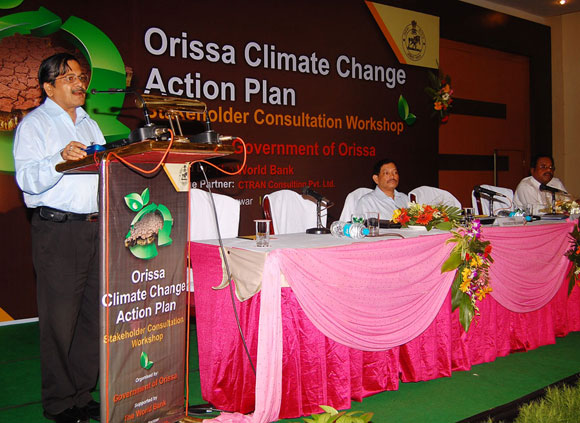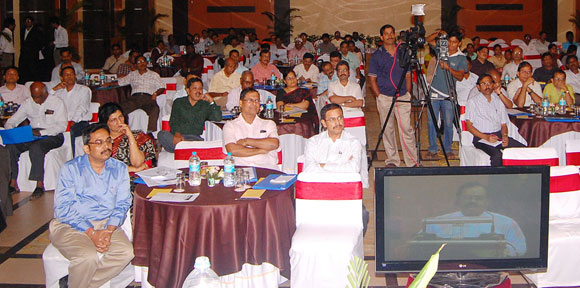
A couple of weeks ago I found myself back in Bhubaneswar, the state capital of Orissa (see the Government of Orissa website), to attend a workshop convened by the state government as part of consultations about its Climate Change Action Plan(the draft Action Plan is available for public consultation on the government website). I always enjoy returning to Orissa, one of four DFID “focus states” in India on which I worked for several years and where I have many friends. It’s a hidden gem in many ways – a unique mix of outstanding temple architecture, history, natural beauty, wildlife, beaches, tribal culture, arts, and great cuisine. But is perhaps better known for its well-documented development challenges.

Actually the state has done pretty well in several respects over the last few years, turning around a public financial crisis and becoming a leading destination for private investment in India. Despite this the poverty rate remains the highest among all states, with 57% of the population living below the national poverty line. This single uncomfortable fact provides the crucial backdrop for the state’s evolving climate change strategy.
In India’s federal system, action by state governments will be needed for progress to be made at a national level – for this reason the central government recently asked all states to prepare their own plans in line with the National Action Plan on Climate Change (available at http://moef.nic.in/index.php). Orissa has been especially quick off the mark in acting on this. To my mind, no other state better demonstrates the importance of factoring climate change into development strategy.
Why? Looking at a range of criteria including floods, droughts, cyclones, heatwaves and agriculture, Orissa is among the most vulnerable states, if not the most vulnerable, to the impacts of climate change. It has been called the “disaster capital” of India. And it’s the poorest – so disproportionately represented in Orissa’s population – who will be least able to cope with the effects of climate change.
And looking at the sources of economic growth in the state, Orissa’s investment boom rests entirely on its huge mineral resources including bauxite and iron ore. In addition to local pollution effects, these mineral-based industries are major consumers of both energy and water. The future path taken by Orissa will therefore provide a test-case in how to reconcile economic transformation and job creation with environmental sustainability and carbon efficiency.
An impressive amount of analysis and consultation across all government departments, as well as a wide range of NGOs and private sector organisations, has gone into the preparation of the draft plan. Nevertheless Mr U.N. Behera, the senior state government official who has tirelessly led and overseen the process, made the point that this should be seen as the first step rather than a fixed and final plan. I thought this was spot on – given the limited international experience in planning for climate change, he understands that Orissa will be “learning by doing”.
Mr Behera and his colleagues deserve to succeed. The world should be watching to see how they fare. As a confirmed friend of Orissa, I certainly will be.

11 comments
Comment by Bipul Chatterjee posted on
Good to know that the state government of Orissa is taking positive steps to address challenges (and there could be opportunities too!) emanating from climate change and related issues. They may be advised to draw policy lessons from Paul Collier's "The Plundered Planet".
Bipul Chatterjee
Deputy Executive Director
CUTS International
Jaipur, India
Comment by Arindam Ghosh posted on
It is indeed very nice to hear about GOO's initiative on climate change. I belong to Orissa and worked in DFID funded power sector reform program in Orissa for several years. I will be closely following how they fare and if possible I would like to contribute too as a member of the state. Orissa had earlier set examples for the world on environment preservation (Olive Ridley Turtles Project). Thanks for sharing this good news.
Comment by David Cronk posted on
I find it kind of ironic that in such an impoverished region like Orissa they are thinking about climate change while most first world countries do little.
I commend them on their forward thinking.
Comment by James Hewitt posted on
A primary reason why Orissa has done "pretty well" recently particularly as a destination for investment is that the economic growth policies are socially and environmentally unsustainable. This should come as no surprise, given that economists so obligingly ignore the social and environmental cost of growth. Much of Orissa's industry is powered by dirty coal fired power stations. One of its leading groups (Vedanta) is being pilloried around the world (including in India and on the London Stock Exchange) for its insistence that the homeland of indigenous peoples becomes a bauxite mine (to supply a neighbouring refinery which should be closed down for repeated breaches of the law for pollution / profit). We must (and in the UK this is proscribed in law) deeply and urgently reduce our greenhouse gas emissions. Orissa's climate strategy is a fig leaf.
Comment by Jason posted on
Orissa's effort in taking action against climate change is really commendable. I guess each of us should consciously take part in our own little way... our concerted effort will go a long way.
Comment by John Goode posted on
About 5 years ago, I regularly worked with a colleague from Orissa. He was from Cuttack. He and I would talk at length about his life there before he relocated abroad.
From his descriptions of the ubiquitous, heart-wrenching indigence plus the world's worst luck in weather with practically yearly guaranteed catastrophic storms, it seems that this new climate change sensitivity/awareness is one of two things: a miraculous change in consciousness for Orissa or a decoy to distract people from on-going environmental recklessness that would blow most Westerners' minds if they knew!
I hope it's the former and that a brighter future is the forecast...for at least some of Orissians.
Thank you for this interesting update.
Comment by Shantanu Mitra posted on
James:
You are right that most of Orissa's inward investment has been in areas and sectors that raise serious issues of social and environmental sustainability. It is both Orissa's fortune and misfortune to contain so much of the minerals that India and the rest of the world demands. India has also announced a commitment to reduce the emissions intensity of its economy (despite the fact that per capita its emissions are less than one-fifth of the UK's) and much of the action to make this a reality will fall to state governments. The Orissa government has been proactive in starting to draw up its plans, so let's wait and see before condemning it as a fig leaf.
Re your comment about economists, some may ignore the social and environmental costs of growth, but good ones don't. Remember that it is also economists who have developed much of the theory and analysis underlying policies to "internalise" these costs in decisionmaking.
regards, Shan
Comment by venkatesh posted on
Good to know that the state government of Orissa is takeing the desired steps in this regard what about the other 3 states in india?
Comment by Gopal K Sarangi posted on
The initiatives taken by Orissa government with the help of the donor agencies to craft an action plan for climate change is really praise worthy. The moot question is that does Orissa have the adequate expertise and financial ability to realise the goals set in the Plan? Is it timely for Orissa to have such a plan? There are couple of fundamental issues need to be addressed before getting into realising the plan prescriptions. Is the action plan complete one? What does the true meaning of an action plan? Do we have our own version of an action plan? Or is it a mimicked version without understanding the peculiar socio-economic condition of the state? Have we gone through the international best practice in making this action plan? What would we do where sectoral overlapping occurs and cross scale issues are pronounced? It is always easy to draft a policy at a broader level, but it is really difficult to make it a reality which is very likely in Orissa which has poorly endowed institutional structure and governance framework.
Comment by Asita Kumar Misra posted on
Respected Sir/Madam,
I want to all staff's working under DFID in CCIP programme in Odisha Center with their contact Phone numbers & email addresses please provide me for official use. I am working with the same in Ministry of Environment & Forests in New Delhi Office.
Comment by BlogModerator posted on
Please contact the DFID India office for details - you can find contact details on this link: http://www.dfid.gov.uk/Where-we-work/Asia-South/India/?tab=2
Thanks,
Blog Moderator